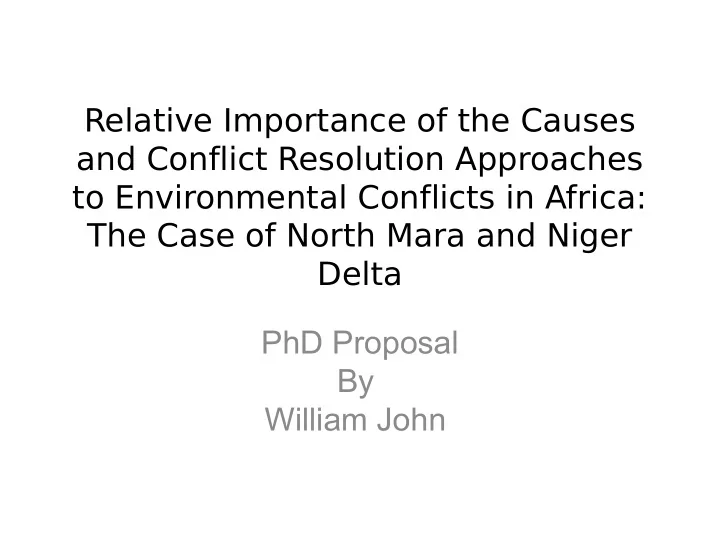

Relative Importance of the Causes and Conflict Resolution Approaches to Environmental Conflicts in Africa: The Case of North Mara and Niger Delta PhD Proposal By William John
Introduction • Environmental conflicts occupy a central part in the contemporary international politics • 1990s wars in Angola, Sierra Leone, Liberia and Ivory Coast • DRC –claimed 5 million people • Darfur –water shortage pushing Arab nomads from the North to the South • Protracted conflict between Sudan North and South claiming 2 million people.
Problem Statement • T anzania is known as an oasis of peace in the troubled continent of Africa.. ?? • No coups, civil or religious conflicts since independence in 1961 & facilitated independence & peace making in fellow African countries. • Increase of environmental conflicts comporting relative peace • More than 67 people killed btn 2008-2010 by policy personnel and private security guards safeguarding North Mara Gold (LHRC, 2011)
Problem Statement cont. • Even though, Nigeria experienced many violent conflict since independence in 1960, eg. 1966 coup overthrowing Azikiwe’s government &later a series of coups in 1966, 1975, 1976, 1983, 1985, 1986, 1990 and 1993 (Francis, 2009). • Environmental conflicts in the Niger Delta: attack of facilities and hostage taking of oil companies’ worker by militant groups, eg. MEND. • In 2008 2009, about 100 attacks reported, nearly 1,000 people died and 300 workers were taken in hostage (Aaron and George, 2010).
Main objective • T o investigate the relative importance of the causes and the conflict resolution approaches to transform the recurring environmental conflicts at North Mara and Niger Delta.
Specific Objectives • T o identify the recurring environmental conflicts Mara (NM) and Niger Delta (ND). • T o examine the relative importance of the factors causing environmental conflicts at NM & ND • T o evaluate the current national and regional conflict resolution approaches to address the environmental conflicts at NM & ND • T o investigate and suggest concrete conflict resolution approaches and policy alternatives to transform the recurring environmental conflict
Significance of the Study • T o policy makers, local communities, activists & investors academic & international community • Revealing gaps embedded in legal and policy framework guiding environmental resources in Africa • Provision of conflict resolution approaches to transform environmental conflict in Africa • Theoretical framework to reflect on envt. confl.
Literature Review • Malthusians: Environmental Conflicts in the Global South are caused by population growth putting stress on envtal resources (i.e. water, land & minerals). • 1994 Rwanda genocide & rapid population growth causing competition for land btn T utsi and Hutu ethnic groups (Billon, 2001). • Senegal-Mauritania conflict over Senegal River Valley in the boarder btn the two countries (Homer-Dixon, 1994)
Literature Review cont. • Opponents: Population growth not a cause, but poor governance & lack of human and physical capital. The Global South has nearly 60% of global resources. • No direct link btn pop growth & envtal conflicts in Rwanda, Sudan, Nigeria, DRC, Liberia, Nigeria etc. • Envtal conflicts are financed and facilitated by multinationals (Ford & Kim, 1995; Baregu, 2002).
Literature Review cont. • Ecological modernization: economic growth (e.g. mining in Niger Delta and North Mara) is compatible with environmental sustainability, as it creates resources for investing in “green technology” mitigating environmental problems and conflicts (Clark and York, 2005). • Opponents: economic growth (i.e. FDI in mining at NM, ND & DRC) cause environmental conflicts as the driving force is profit making coming at the expense of people and the environment.
Literature Review cont. • Resource curse thesis: environmental conflicts are caused by abundance of resources creating incentives for rebels, incumbent leaders to overstaying in power, land expropriation etc. • UNITA maintained her war with the Angolan government by plundering diamond in the Northern part of the country. Demanded the ministry of Geology and Mining to sign the 1994 Lusaka Agreement (UNEP, 2009).
Conflict Resolution & transformation Approaches • State centric i.e. Joint T ask Force (JTF) and FFF at North Mara? They contain conflict not resolve & transform, make the people more resistant, fail to articulate the people’s demands etc. (Aaron and George, 2010). • Bottom up approach: deliberative democracy? Equitable share of benefits? Etc. • T raditional Approaches?
Theoretical framework • Human security approach- freedom from fear (security) want’ (development). • Human security= environmental threats (fear about water, land or air degradations), deprivation and exclusion and vulnerability (the presence of poverty & marginalization) & vulnerability (exposure to environmental threats) (Bronkhost, 2011, p.9).
Theoretical framework cont. • Political ecology approach : functions to explain environmental conflict & injustices linked to: “(1) the marginalization of local residents from environmental discourses, (2) conflicts between developers and environmentalists and the exclusion of local residents […]” & politicization of the envt. • State and IOs = Environmental conflicts • Favors home grown approach to envtal conflicts
Research methodology • Qualitative case study: It explores, describes and explains complex course of issues eg. Environmental conflicts. • Sampling: Purpose sampling= local communities of Ogoni land, Niger Delta, Nigeria and North Mara, T arime district. Officials of Ministry of land, Ministry of Environment, Ministry of Natural Resources and Minerals, NDDC, NDDB, OMPADC, MEND, NEMC, BAKWATA, TEC, CCT etc.
Research Methodology cont. • Data collection Methods: Interviews (30 respondents), FGDs & document review with population sampled purposively. • Data Analysis : Content analysis technique studying the content of communication i.e. interview, FGDs and document review. Examines what, how & why the sampled pop talk about the relative importance of the causes and conflict resolution approaches to environmental conflicts
BAIE DANKIE
Recommend
More recommend